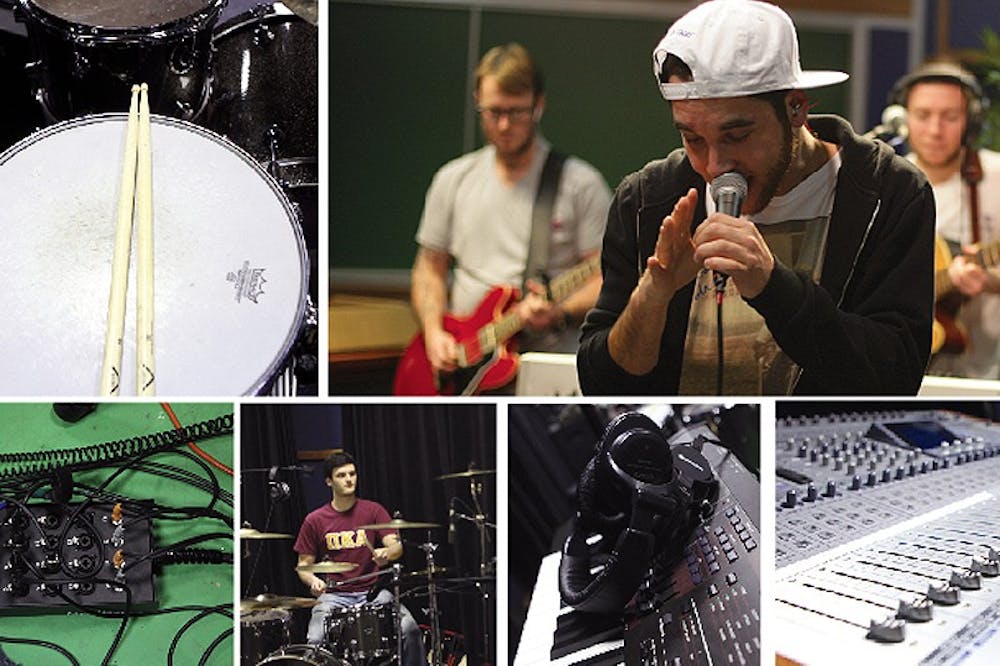Buried in the depths of the Bryan Center lies one of the nicest recording studios most college students will ever see. Completely student run, Small Town Records is one of Duke’s best kept secrets, and one that remains such at a high cost to the campus’ creative community.
Small Town not only records Duke students free of charge, but also operates as a booking agent, recording studio, publicist and even venue for a small audience. This one-stop-shop model could very well be the future of the music industry as it compensates for a market that is completely saturated with artists searching for a way to streamline their journey to recognition.
Few will question that the music industry is in a state of flux. Music, from folk to electronic, is seeping out of all corners of the Internet and world. It’s up to the college-aged generation to decide where the industry will go. As Small Town Records President and senior Julian Jacobson describes, a large part of the demographic listening to music is just looking for “good” music. Where he differs from many others is his view that “good” can encompass a diversity of sounds, ranging from hip-hop to experimental rock. Identifying this element of good music is something at which Small Town Records has been increasingly successful, hosting filmed sessions with artists ranging from the Young Rapscallions to Courrier, both acts with widening fan bases.
In addition to finding interesting and appealing new sounds, Jacobson likes to maintain a sense of humor in conjunction with the music Small Town releases. Jacobson says that a rearranged cover of Taylor Swift’s “I Knew You Were Trouble” released in early February by Point Break—the band in which he plays—exemplifies this.
Small Town Records was founded by students as a class project in 2006 and later that year became a part of Duke University Union, which continues to provide funding for the studio. Small Town Records’ beginnings were not nearly as glamorous as its current setup. Formerly housed in the basement of the West Union Building, the studio’s control room was literally a converted broom closet—a closet that recorded tracks for Mike Posner and two then-Duke student members of the now-exploding Delta Rae, a folk rock band.
Small Town Records is hyper-aware of the college generation’s need for an experience that is both visual and auditory. Younger generations, so accustomed to multi-tasking, want their music to span more than one dimension of sound and visual experience, Jacobson says. That’s why in the past year, Small Town has incorporated videos into their new releases through their distribution website, BDBeats.com. BDBeats releases videos weekly that range in style from drum covers of hip-hop jams by Point Break drummer, junior Tyler Matte, to in-studio recordings of artists passing through the Durham area. The immediate market for these releases is the Duke and Durham community, but Small Town recognizes the power of the Internet. The label’s ultimate dream is to reach a national audience through the rapidly growing power of social media—an ambitious objective but certainly not impossible if the label keeps growing at the rate it has since its inception.
This spring, Small Town Records will release four new albums, varying in genre from singer-songwriter to funk-rock. Sophomore Christina Lan, graduate student Mike Wang, Point Break and a currently unnamed band are all releasing albums on the label. These albums will drop at the Small Town Records Release Party April 18 at Devine’s Sports Bar and Grill.
In summer 2012, Small Town Records found out that it would be losing its space in West Union as a result of upcoming renovations. With this in mind, Small Town worked with the University to relocate and expand, moving into the Bryan Center, where it now shares Duke Student Broadcasting’s studio. The new facilities feature a significantly larger control room than the old studio had, as well a slew of traditional recording equipment—including a mixing board, a computer, microphones and other recording equipment.
As a newer organization, Small Town Records has significant potential to be molded into whatever students are seeking—including sound engineering, filming, marketing and finance. “[Small Town Records is ] a collaborative effort… students own what the progress is,” says studio manager and senior Laura Valk. “It’s something to take hold of and direct in the way you want it to go.”
The studio offers free recording to any Duke student who schedules practice time. With the number of Duke students who played an instrument in high school, there should be an abundance of musical collaboration throughout the Duke community, Jacobson said. Yet, many students don’t even bring their instrument along with the move to college. “Why do you have to abandon what you love and you’ve been doing for so long?” Jacobson challenges.
As more students discover the opportunities provided by Small Town Records, one would hope that this changes. “If you are interested in music at all, you need to check out Small Town,” Valk adds. “It is the hub of music at Duke.”
Jacobson conveys the label’s philosophy perfectly: “I just want people to make music and have a good time.”
Get The Chronicle straight to your inbox
Signup for our weekly newsletter. Cancel at any time.

